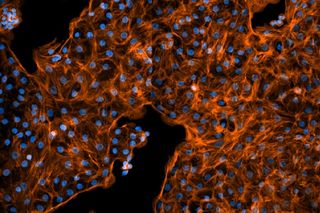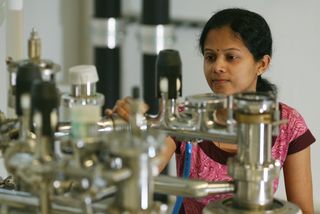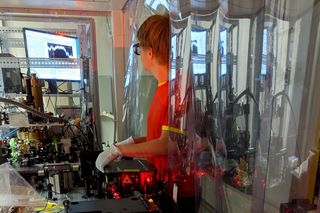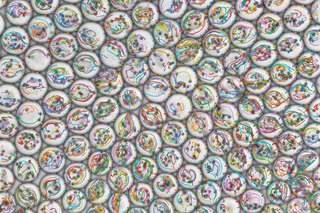With the English-language master's course of study Physics, you will deepen and broaden your basic knowledge in modern areas of experimental and theoretical physics. Physics elective lectures allow you to specialise in a current area of physics. The master's course of study is research-oriented. You complete the programme with an independent research thesis, the 23-week master's thesis.
For this two-year master's course of study, you need a bachelor's degree in physics with a duration of study of three years (180 credit points).
Master's Tracks
Within this course of study, you can specialise in one field. To do this, you enrol in the Master's course of study Physics and attend the courses recommended for the specialisation. It is not necessary to specify a specialisation when enrolling into the course of study. You can choose from the following Master's tracks:
Additional Information on the Application
You obtained your first university degree in Germany and would like to apply for the master’s course of study Physics? Then please apply via AlmaWeb and submit the following documents in addition by e-mail or by mail to the dean of our faculty:
-
Application for evaluation of admission requirements (informal letter or email)
-
Transcript of records/certificate of a first professional degree
-
Short curriculum vitae in tabular form
-
Proof of knowledge of the English language at the level B2 of the Common European Framework of Reference (or equivalent)
If you apply for a start in a winter semester, please submit these documents by 1 September of the same year. If you apply for a start in a summer semester, please submit these documents by 1 February of the same year.
The master's admissions committee uses these documents to check whether you meet the requirements for the admission to the master's course of study. You will receive a written notification about this, which you should submit to the Studierendensekretariat with the other documents for your enrolment.
Please apply via AlmaWeb by 15 September of each year for the winter semester and by 15 March of each year for the summer semester.
You obtained your first university degree abroad? In this case, please apply directly via uni-assist e.V.. Please apply for a winter semester by 31 May of the same year and for a summer semester by 31 December of the previous year.
Structure of the Course of Study
The master's course of study Physics is divided into two one-year phases: the expansion and advanced phase and the research phase.
| Modules | ||||
|---|---|---|---|---|
| 1st Sem. | Elective Area 1 (Experimental Physics) | Elective Area 2 (Theoretical Physics) | Elective Area 3 (Advanced Seminar) | Elective Area 4 |
| 2nd Sem. | ||||
| 3rd Sem. | Research Project 1 | Research Project 2 | ||
| 4th Sem. | Master’s Thesis | |||
The information on the module numbers and credit points can be found in the detailed overview.
In the research phase, you will be guided in a selected specialised field to work on issues relating to current national and international research. In the fourth semester, the focus is on the master's thesis. You can also do this in cooperation with domestic or foreign companies, universities or research institutions.
Elective Areas
Elective Area 1 (Experimental Physics)
For the elective area 1 (experimental physics), you choose a module from the following compulsory elective modules:
| Sem. | Module No. | Module Title | CP |
|---|---|---|---|
| 1/2 | 12-PHY-MWPE1 | Advanced Solid State Physics | 10 |
| 1/2 | 12-PHY-MWPE2 | Soft Matter Physics | 10 |
| 2 | 12-PHY-MWPASM | Soft Matter and Biological Physics | 10 |
Elective Area 3 (Advanced Seminar)
In the elective area 3 (advanced seminar), the focus is not only on imparting specialist knowledge, but also on developing and improving methodological skills. These are literature research, presentation skills and academic writing.
You choose one module from the field of the advanced seminars (five CP). If desired, another advanced seminar can be credited in the physics-related electives (elective area 4).
In each semester, aspects of current topics from the research areas of our departments are studied in the main seminars. Possible topics include: surface physics, magnetism and superconductors, biological physics, cell mechanics, molecular nanotechnology, quantum optics, quantum field theory, gravity, condensed matter theory, quantum theory of condensed matter, quantum statistical physics, complex systems and complex quantum systems.
| Sem. | Module No. | Module Title | CP |
|---|---|---|---|
| 1/2 | 12-PHY-MWPSKM | Specialised Topics of Solid State Physics | 5 |
| 1/2 | 12-PHY-MWPSWM | Specialised Topics of Soft Matter Physics | 5 |
| 1/2 | 12-PHY-MWPSTP | Specialised Topics of Theoretical Physics | 5 |
| 1/2 | 12-PHY-MWPSMP | Specialised Topics of Theoretical and Mathematical Physics | 5 |
Elective Area 4 (Physics-Related Electives)
For the elective area 4 (physics-related electives), you choose modules with a total of 35 CP from the following elective modules for the master's course of study. Ten CP of these can be taken from the non-physics electives. For this you can choose all modules of our university, provided that the person responsible for the module and the offering institute accepts students from the course of study MSc Physics. You can also choose modules from elective areas 1 and 2 that you have not yet taken or another module from elective area 3.
In this master's course of study you can also take the bachelor's modules mentioned below if the knowledge imparted there is necessary for taking the master's modules.
Please note that not all modules can be offered once a year. You can find the current offer can be found in our course catalogue.
| Sem. | Module No. | Module Title | CP |
|---|---|---|---|
| 2 | 12-PHY-MWPSUM2 | Superconductivity II | 5 |
| 1 | 12-PHY-MWPSUM3 | Laboratory Superconductivity and Magnetism | 5 |
| 1/2 | 12-PHY-MWPIOM6 | Magnetism | 5 |
| 2 | 12-PHY-MWPSEF1 | X-ray Techniques | 5 |
| 2 | 12-PHY-MWPHLP3 | Semiconductor Physics II: Semiconductor Devices | 5 |
| 2 | 12-PHY-MWPHLP5 | Laboratory Work in Semiconductors II | 5 |
| 1/2 | 12-PHY-MWPHLP6 | Semiconductor Physics III: Semiconductor Optics (Moduldauer 2 Semester) | 5 |
| 2 | 12-PHY-MWPAMR1 | Magnetic Resonance and Imaging in Soft-Matter | 5 |
| 1/2 | 12-PHY-MWPMQ3 | Nuclear Magnetic Resonance Laboratory | 5 |
| 1/2 | 12-PHY-MWPMQ3 | Electronic Spin Resonance Laboratory | 5 |
| 1 | 12-PHY-MWPKP1 | Nuclear Physics | 5 |
| 2 | 12-PHY-MWPXT2 | Particle Physics | 5 |
| 2 | 12-PHY-MWPQT2 | Quantum Technology 2 | 5 |
| 1 | 12-PHY-MWPQT3 | Quantum Technology 3 | 5 |
| 2 | 12-PHY-MWPMON3 | Active Matter Physics | 5 |
| 1/2 | 12-PHY-MWPGFP | Physics of Nanoporous Materials | 5 |
| 1 | 12-PHY-MWPEMSP | Single-Molecule Spectroscopy | 5 |
| 1/2 | 12-PHY-MWPQSB | Quantitative Systems Biophysics | 5 |
| 1 | 12-PHY-MWPM1 | Cellular Biophysics 1 | 5 |
| 2 | 12-PHY-MWPM3 | Cellular Biophysics 2 | 5 |
| 1 | 12-PHY-MWPPOC1 | Physics of Cancer I | 5 |
| 2 | 12-PHY-MWPPOC2 | Physics of Cancer II | 5 |
| 1/2 | 12-PHY-MWPTKS1 | Stochastic Processes in Physics, Biology and Earth Sciences | 10 |
| 1/2 | 12-PHY-MWPTKS2 | Non-linear Dynamics and Pattern Formation | 10 |
| 1/2 | 12-PHY-MWPTKS3 | Practical Course: Complex Systems | 5 |
| 1/2 | 12-PHY-MWPTKM3 | Theory of Soft and Bio Matter | 10 |
| 1/2 | 12-PHY-MWPTKM4 | Practical Course: Condensed Matter Theory | 5 |
| 1/2 | 12-PHY-MWPCQM1 | Practical Course: Quantum Theory of Condensed Matter | 5 |
| 1/2 | 12-PHY-MWPCQM2 | Physics of Driven and Open Quantum Systems | 5 |
| 1/2 | 12-PHY-MWPCQM3 | Geometry and Topology in Quantum Matter | 5 |
| 1 | 12-PHY-MWPQFG1 | General Relativity | 10 |
| 2 | 12-PHY-MWPQFG2 | Cosmology | 10 |
| 1/2 | 12-PHY-MWPQFG3 | Quantum Field Theory on Curved Space Times | 10 |
| 1/2 | 12-PHY-MWPQFG6 | Practical Course: Quantum Field Theory and Gravity | 5 |
| 1/2 | 12-PHY-MWPTET4 | Relativistic Quantum Field Theory | 10 |
| 1/2 | 12-PHY-MWPSTP1 | Quantum Field Theory of Many-Particle Systems | 10 |
| 1/2 | 12-PHY-MWPSTP2 | Statistical Mechanics of Deep Learning | 10 |
| 1/2 | 12-PHY-MWPTKM5 | Practical Course: Quantum Statistical Physics | 5 |
| 2 | 12-PHY-MWPMMP1 | Black Holes | 10 |
| 1/2 | 12-PHY-MWPXT1 | Group Theory and Its Applications in Physics | 10 |
| Sem. | Module No. | Module Title | CP |
|---|---|---|---|
| 1 | 12-PHY-BW3MO1 | Introduction to Photonics I | 5 |
| 1/2 | 12-PHY-BMWMO2 | Introduction to Polymer Physics | 5 |
| 1 | 12-PHY-BW3CS1 | Introduction to Computer Simulation I | 5 |
| 1/2 | 12-PHY-BMWEMB | Introduction to Biophysical Methods | 5 |
| 1 | 12-PHY-BMWMED1 | Introduction to Medical Physics | 5 |
| 1 | 12-PHY-BW3HL1 | Semiconductor Physics I | 10 |
| 1 | 12-PHY-BW3HL2 | Laboratory Work in Semiconductors I | 5 |
| 1/2 | 12-PHY-BMWOFP1 | Surface Physics, Nanostructures and Thin Films | 5 |
| 1 | 12-PHY-BMWIOM2 | Plasma Physics, Thin Film Deposition and Characterisation | 5 |
| 2 | 12-PHY-BMWIOM3 | Microstructural Characterisation | 5 |
| 1 | 12-PHY-BMWQMAT | Quantum Matter | 5 |
| 1 | 12-PHY-BW3QN1 | Quantum Physics of Nanostructures | 5 |
| 1 | 12-PHY-BMWQT1 | Quantum Technology 1 | 5 |
| 2 | 12-PHY-BMWQTPR | Quantum Technology – Lab Course | 5 |
| 1 | 12-PHY-BMWQS1 | Quantum Sensing | 5 |
| 2 | 12-PHY-BMWQC1 | Quantum Communication | 5 |
| 2 | 12-PHY-BMWQIT | Quantum Information Theory | 5 |
| 2 | 12-PHY-BMWMMP1 | Introduction to General Relativity | 5 |
| 1 | 12-PHY-BW3MQ1 | Spin Resonance I | 5 |
| 1/2 | 12-PHY-BMWSUM | Fundamentals of Magnetism | 5 |
| 2 | 12-PHY-BW3SU1 | Superconductivity I | 5 |
| 2 | 12-PHY-BW3XAS1 | Stellar Physics | 5 |
| 2 | 12-PHY-BMWXAS2 | Stellar Physics Laboratory | 5 |
| 1 | 12-PHY-BMWXAS3 | Extragalactic Astronomy and Cosmology | 5 |
| 1 | 12-PHY-BMWXAS4 | Extragalactic Astronomy Laboratory | 5 |
| 1 | 12-PHY-BMWBNE1 | Action Competence for Sustainable Development – Fundamental Module | 10 |
| 1/2 | 12-PHY-BMWNUM | Numerical Approaches to Theoretical Physics | 5 |
| 1/2 | 12-PHY-BMWMME | Mathematical Methods of Modern Physics | 5 |




